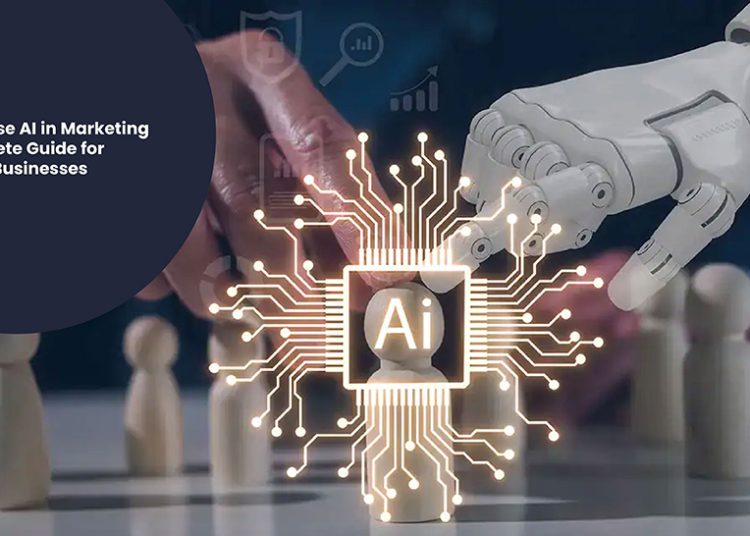Artificial Intelligence (AI) is gradually dominating various aspects of businesses, including marketing. It revolutionizes marketing by allowing businesses to tailor experiences as per the customers’ needs, automate tasks, and make smarter data-driven decisions. The AI tools assist marketers in saving time, improving their campaign outcomes, and boosting engagement. If you are a small business owner or a part of a large-scale marketing team, it is essential to learn how to use this technology to obtain the optimum result. The article below explores the significance of AI in marketing and then explores various ways businesses can adopt to use it.
The Role of AI in Marketing
69.1% of marketers now use AI in their day-to-day work. This statistic implies its broad acceptance across the industry. Here’s a brief on the significance of AI in marketing.
- Marketing teams rely on automated processes driven by AI to streamline marketing tasks and free up their marketing team so that they can focus on other critical tasks.
- It assesses customer behavior patterns to provide marketers with valuable insights on how to reach the right audience with the appropriate message, at the right time.
- It personalizes content, recommendations, and offers as per the individual preferences and thus helps boost customer engagement and brand loyalty.
- The data-driven insights provided by AI tools can help businesses optimize their campaign performance and wisely allocate resources. Eventually, this helps improve their marketing ROI.
Ways to Use AI in Marketing
Businesses can adopt the following ways to effectively leverage AI in marketing.
1) Analyze the needs and goals
Before beginning to use AI tools, it is vital to know what your business aims to achieve. It may be enhancing customer personalization, boosting marketing campaigns, automating tasks, etc. Setting clear objectives can help achieve measurable success.
You can begin analyzing what areas of marketing operations would benefit the most from AI. It involves assessing the current processes, expected challenges, and key performance indices. Subsequently, you can get a clear perspective on how to define goals that align with your strategy. To dive deeper into how AI can boost your brand’s performance in marketing, check out this resource on AI-powered brand performance tools.
Here are tips that help better analyze the needs and accordingly refine the marketing strategy:
- Analyze whether your business has any iterative tasks that are consuming a lot of resources and time. If yes, then you need to choose an AI tool that can help streamline the specific iterative tasks.
- Ask yourself whether your business deals with a huge volume of data but faces difficulty understanding or using it well. In this case, adopt AI-driven analytics tools because they can automatically organize, interpret, and visualize complex data to provide valuable insights.
- Before moving forward, get a clear picture of whether the implementation of AI in marketing is worth the time and resources.
2) Audit the current marketing strategies
Carry out a comprehensive audit of current marketing strategies and tools. Identify what’s working and what needs improvement. The audit helps you spot areas where AI implementation can make a significant impact (it can be through data analysis, automation, or improved targeting).
Let’s take an example to understand better. Suppose your business priority is improving conversions, then it is better to focus on how leads are currently nurtured and the type of content that drives customer engagement. The identifications of these gaps early can help you choose the most suitable AI solution. Carrying out audits can save time and money by demonstrating what works and what doesn’t.
Read More: AI in Everyday Life: How Artificial Intelligence is Changing the Way We Live
3) Determine AI tools to use
With a plethora of AI tools for marketing, it is easy to get confused. It is essential to pick one that aligns with the needs of the marketing team. Review tools that align with your marketing objectives –it can be customer service, analytics, or customer support. Some of the AI consulting services can provide the expertise to ensure a smooth and effective integration on selecting and implementing the right AI tools. You can consider below factors when evaluating AI tools:
- Define your budget for AI implementation and compare the same with the costs of different tools.
- Review the specific features of some of the most relevant AI tools and learn how they align with your marketing needs.
- Check the tool’s interface; it must be such that your marketing team can get used to it easily, without rigorous training.
- If your business already uses marketing tools, then make sure the AI tool can integrate with them to ensure a smooth workflow.
- Check some of the AI tools you have shortlisted on how accurately they predict. This can be done by having a free trial or going through customer reviews.
4) Develop a plan
After knowing what AI tools to use and their use cases, it is now important to create a plan for the implementation in the marketing department. This plan must incorporate allocations of budget, setting realistic timelines, and understanding resource requirements. Enlist the steps to integrate AI platforms into your current system. You can consider factors like system migration, data migration, and potential disruptions (if any) to existing workflows.
90% of the marketers who already use AI state that it helps them with faster decision-making. So, crafting a well-defined plan with thorough considerations can help ensure effective outcomes.
5) Train the marketing team
Not all team members are well-versed in AI. Make sure that all of them understand the benefits of using AI in marketing. It is essential to impart training on AI tools. If needed, you can hire new staff with AI expertise. Creating a team culture that welcomes AI makes it simpler to use and obtain good outcomes from it.
6) Test and tailor the plan
After choosing the appropriate AI tools, developing the plan, and preparing the team, it is essential to test the AI into action. Begin with small tests and trials and then move forward to full-scale implementation. This approach will help you spot any potential issues and adapt the process accordingly. Prioritizing data privacy and ethics helps your business build trust among customers and prevent potential legal issues.
7) Monitor and optimize
Track the performance of the AI systems by using metrics such as ROI, conversion rates, etc. You must periodically refine your AI marketing strategies as per the customer feedback and performance data. Keep an eye on the accuracy, performance, and flexibility of the outputs and make required adjustments.
Tips to Effectively Use AI in Marketing
- AI models can work effectively only if the data input is accurate, clean, and useful. Inappropriate data can lead to poor outcomes. Hence, make sure the data is reliable, precise, and well-structured to have accurate insights.
- It is fine to use AI to generate content, get insights, and manage repetitive tasks, but involve humans in the strategy, brand voice, and storytelling. This approach will help your business maintain authenticity.
- It is recommended to pilot AI tools in particular marketing functions you intend to use and then proceed with the full-scale adoption.
- Monitor the performance of AI-led campaigns, carry out A/B tests, and adapt strategy based on the performance insights to stay competitive.
Final Words
AI helps modern businesses do marketing faster and smarter. It helps deliver personalized experiences, saves time on repetitive tasks, and improves customer targeting. Both small and large-scale businesses can adopt AI responsibly, along with a human perspective to ensure the best outcome. When used the right way, it can help modern businesses grow and meet customers’ expectations more effectively.
Author Bio – Jigar Agrawal
Jigar Agrawal is a Digital Marketing Manager at eSparkBiz Technologies. He is passionate about anything related to Marketing and Trending Technologies. Wants to leverage the world of technology and Social Media where every day there is a chance of new possibilities as well as innovation.
Read More: The Future Role of Artificial Intelligence in the Workplace








